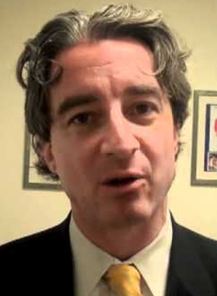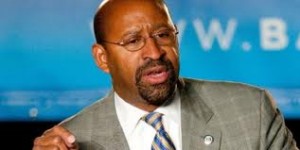Ben Austin of Parent Revolution and Rick Hess of the American Enterprise Institute have been engaging in a civil dialogue on the merits of educators and parents being able to purchase instructional and management services from for-profit corporations. Austin opposes allowing parents and educators to have this option, while Hess is a supporter.

While Ben Austin (pictured here) is clearly well intentioned, his argument is based on ideology and politics, and not good public policy.
Austin’s advocacy of parental empowerment derives from his belief that public education too often puts adult needs over the needs of children. He thinks giving parents more influence over how their children are educated will move students to the center of educational decision-making. But Austin opposes allowing parents to contract with for-profit corporations because he thinks these companies will be more concerned with profit than children’s needs. A summary of Austin’s position was recently posted on the Parent Revolution blog: “Because we believe children need to be put first in every decision, it is far better to have non-profit organizations – accountable to parents, taxpayers and a stated mission – than a for-profit organization, which by definition is accountable first and foremost to investors and shareholders … ”
Hess argues that for-profit corporations already provide billions of dollars of products and services to school districts every year, and if parents decide a for-profit company can best meet their children’s needs, they should be allowed to work with it.
I agree with Hess. While Ben Austin is clearly well intentioned, his argument is based on ideology and politics, and not good public policy. Parents should be free to contract with providers that best meet their children’s needs.
The ad hominem aspect of Austin’s argument is troubling. While I was doing my holiday shopping this year, the gender, sexual orientation, race and ethnicity of the salespeople I talked to was irrelevant, as was their employer’s tax status. What was relevant was the quality and price of the products or services they were selling. I suspect Ben has these same priorities when he shops, and he likewise does not consider a corporation’s tax status when he purchases products and services for his family and friends. (more…)
 Recent election outcomes offer a snapshot of what people really think about education reform, said John Podesta, chairman and founder of the Center for American Progress. And lawmakers, advocates and opponents of school reform should all take note.
Recent election outcomes offer a snapshot of what people really think about education reform, said John Podesta, chairman and founder of the Center for American Progress. And lawmakers, advocates and opponents of school reform should all take note.
This month’s stunner - the ousting of Indiana public schools chief Tony Bennett, who implemented many of the same reforms found in Florida – is proof enough that reform “is not yet on solid ground,’’ said Podesta, the keynote speaker Tuesday during the fifth annual Excellence in Action National Summit in Washington, D.C.
At the same time, he noted, there are plenty of signs of progress, including historic passage of a ballot initiative in Washington that paves the way for charter schools.
The common ground seems to be a desire to create a system that works for children, he said, and reformers should seize the moment.
“As the lines blur, the movement has to invest in collaboration … ,’’ said Podesta, a former White House chief of staff to President Bill Clinton and longtime policy adviser.
“I think complete division between unions and reform is not helpful,’’ he said. “We have to let this go.’’
He also said reformers can’t “steamroll’’ measures without educating the public. “Stop just focusing on your enemy and start shoring up your allies,’’ he said. (more…)
The lineup for this week’s Jeb Bush education conference is further evidence that a growing centrist coalition has emerged to move the ball on education reform and school choice.
This is the Foundation for Excellence in Education’s fifth national summit, and it grows in both stature and bipartisanship every year. Two years ago, it made headlines when President Obama’s education secretary, Arne Duncan, was announced as a keynote speaker. This year, Duncan’s speaking again. So is John Podesta, the former Clinton chief of staff who heads the left-leaning Center for American Progress; and Gloria Romero, the former Democratic California state senator who authored the original parent trigger bill; and, on various panels, other Democrats like North Carolina Gov. Bev Perdue and Virginia State Delegate Algie Howell.
So, on the one hand, it’s no longer so notable that more and more liberals and progressives and Democrats are part of this constellation. On the other hand, holy smokes! Clearly, they’re not on the same page with Jeb Bush and fellow conservatives on every education issue. But the strength of the arguments in favor of ed reform and school choice, and the leadership of folks like Bush and Obama, have galvanized people from all across the political spectrum to have respectful, thoughtful discussions about our schools and our kids in ways that just weren’t possible 10 or 15 years ago.
I don’t know how long this will last, but the 2012 elections have at least produced a renewed call in Congress for a bipartisan solution to the deficit crisis. I suspect this is a rare opportunity in education, and reformers of all stripes would be wise to recognize it as such, and to do what they can to extend it. One way to foster that political cooperation is to make the public better aware that all this is happening – that Republicans and Democrats have actually found common ground on more than a few planks of ed policy. (more…)
This recent speech is 22 minutes long, but Michael Johnston's stories about Tasha and Flavio make it worth every second. Johnston is the Democratic state senator from Colorado who made a name for himself last year when he led the charge to overhaul teacher pay and tenure. He's also a former teacher and principal, and a Teach for America alum. He delivered this gem - a Forbes columnist called it the "best speech about education -- ever" - at a TFA benefit dinner. Get the tissues now. These words in particular will sear themselves deep: "You think I can have that?"
Pity the parent trigger. Its political identity crisis never ends.
In Florida, the trigger erupted in a state House race this week, with a Democratic challenger accusing her Republican rival in an attack ad of voting last spring “to take control of our schools away from parents and teachers, and give it to out of state corporations instead.” This is no surprise, given how effectively Florida critics – including many Democrats – have portrayed the trigger as a spawn of the right.
 But meanwhile, one of the progressive Democrats most closely associated with the parent trigger indicated in an op-ed that he couldn’t support a trigger proposal in Michigan. Why? Because it doesn’t bar for-profit charter schools from being among the parent-picked turnaround options. Ben Austin (pictured here), who leads Parent Revolution, went even further, writing, “Parents must have power over the education of their own children. Profit has no place in that education.”
But meanwhile, one of the progressive Democrats most closely associated with the parent trigger indicated in an op-ed that he couldn’t support a trigger proposal in Michigan. Why? Because it doesn’t bar for-profit charter schools from being among the parent-picked turnaround options. Ben Austin (pictured here), who leads Parent Revolution, went even further, writing, “Parents must have power over the education of their own children. Profit has no place in that education.”
This guy is a wild-eyed privatizer?
Austin’s comments drew a swift rebuke from the ed policy director at the Mackinac Center for Public Policy, which many would consider conservative: “While the notion that schools should be ‘above’ self-interest and the profit motive has a certain raw populist appeal, a moment’s reflection reveals it to be ridiculous,” wrote Michael Van Beek. “Should schools also purchase only textbooks produced on charitable printing presses? Should their cafeterias only serve food grown on government farms?”
Beek also criticized the trigger because it’s limited to parents in the poorest performing schools. All parents, he wrote, should have access to this power. (more…)
Michelle Rhee, in this morning's Tampa Bay Times:
I'm a Democrat because I believe in the party's basic principles, particularly the idea that we have to look after one another and stand up for those who need help. I believe in fighting for the civil rights of all Americans, especially children and those facing injustices.
That's why I was heartened to see Chicago Mayor Rahm Emanuel advocating for the rights of kids in his standoff with the Chicago Teachers Union. Although his stance made perfect sense to me, it surprised many political observers.
Emanuel went head to head with the union to get a better contract for the city's schoolchildren. In the process, he underscored a transformation in the Democratic Party. Increasingly, those who staunchly side with unions at any cost appear to be in the minority, while more Democrats are saying we have to look at education differently. Full op-ed here. RedefinED interview with Rhee, on why ed reform must be bipartisan, here.
From the Associated Press tonight:
CHICAGO (AP) -- The Chicago teachers union decided Sunday to continue its weeklong strike, extending an acrimonious standoff with Mayor Rahm Emanuel over teacher evaluations and job security provisions central to the debate over the future of public education across the United States.
Union delegates declined to formally vote on a proposed contract settlement worked out over the weekend with officials from the nation's third largest school district. Schools will remain closed Monday.
Union president Karen Lewis said teachers want the opportunity to continue to discuss the offer that is on the table.
"Our members are not happy," Lewis said. "They want to know if there is anything more they can get."
She added: "They feel rushed."
 In Orlando back in June, Philadelphia Mayor Michael Nutter and other big-city Democratic mayors convinced the U.S. Conference of Mayors to unanimously endorse the idea of parent triggers - and were promptly savaged by critics. They were tools of ALEC, profiteers, enemies of public schools.
In Orlando back in June, Philadelphia Mayor Michael Nutter and other big-city Democratic mayors convinced the U.S. Conference of Mayors to unanimously endorse the idea of parent triggers - and were promptly savaged by critics. They were tools of ALEC, profiteers, enemies of public schools.
Nutter just spoke to the DNC a few minutes ago, and if he's a right-wing fringie out to gut public education, he's also got a bright future as an actor. Frankly, with tonight's script, he sounded a lot more like an establishment Democrat than a reform-minded one. But the point isn't to critique Nutter's positions on education policy. It's to note that some particularly vocal ed reform critics have become so rigid, they're disparaging - and potentially alienating - fair-minded people who actually agree with them much of the time.
Here are the prepared remarks for Nutter's speech:
I'm honored to serve as mayor of my hometown where our founders started America with three simple words: "We, the people." And when they said "people," they didn't mean "corporations."
I'm most honored to be the father of Christian and Olivia, and a proud parent of a public school student.
My wife, Lisa, and I know Olivia's education is central to everything she, and everyone in my city, wants to achieve. In Philadelphia, our public safety, poverty reduction, health and economic development all start with education. We can't grow the middle class if we don't give our kids the tools they need to innovate and invent.
But first we have to invest in them. That's what President Obama did, saving 400,000 educators' jobs and giving states the flexibility to shape their schools.
Mitt Romney doesn't get it. (more…)
We want to spotlight two new videos that highlight the tension – and potential for change - that we’ve been seeing all week between education factions at the Democratic National Convention. The first is from Democrats for Education Reform; the second, from TEACHED. To whet your appetite, here are some choice quotes. Remember, these are Democrats saying these things, many of whom were in Charlotte this week.
“These bureaucracies have a way of outlasting the reformers, of insulating themselves from really deep reforms ... In our schools today across the country but particularly here in California, performance isn't taken into account at all.” – Los Angeles Mayor Antonio Villaraigosa
“We have to really focus on teacher quality. We have to focus on holding our schools accountable.” – Indiana State Rep. Ann Sullivan
“We can no longer operate insanity in this country.” – Ohio State Sen. Nina Turner
“We’ve got to do radical things.” – Denver Mayor Michael Hancock
"You have powers in place, and people in power, that have been around a long time and are comfortable with the way things are ... We know that all kids don't have access to opportunity. And so a Democrat who believes in education reform is somebody that's willing to say we can do it better, and it's okay to do things differently." - Maryland State Sen. Bill Ferguson
 The battle for the soul of the Democratic Party, at least in the area of public education policy, was on full display yesterday at two panel discussions organized by Democrats for Education Reform. (Full disclosure: I am DFER’s Florida coordinator.)
The battle for the soul of the Democratic Party, at least in the area of public education policy, was on full display yesterday at two panel discussions organized by Democrats for Education Reform. (Full disclosure: I am DFER’s Florida coordinator.)
The first panel consisted of Democratic state legislators from Colorado, Indiana, New Jersey, North Carolina and Ohio discussing their legislative efforts to improve public education by changing teacher evaluation, tenure and compensation systems. These initiatives, generally opposed by teachers unions, are designed to make the current factory model of public education more effective and efficient by giving management more control over personnel decisions.
The second panel included the presidents of the two national teachers unions (Dennis Van Roekel of the National Education Association and Randi Weingarten of the American Federation of Teachers), two educational entrepreneurs with strong technology backgrounds (John Katzman from 2tor and Noodle.org, and Joel Rose from New Classrooms Innovation Partners), and Joe Reardon, the mayor of Kansas City, Kansas. They discussed what a post-factory model of public education might look like. There was broad agreement among these diverse panelists that customized learning is the future of public education. They all emphasized the importance of innovation and entrepreneurship, and the economic and moral imperative of more effectively overcoming the achievement gap related to family income.
The fault lines within this second panel, and in the Democratic Party as a whole, appeared when the moderator, Jonathan Schorr from the NewSchools Venture Fund, asked about the role private providers should play in public education. After acknowledging that private, for-profit companies provide buildings, desks, buses, textbooks, computers, pencils and electricity for district schools, both Weingarten and Van Roekel opposed allowing nongovernment employees to teach in public education, arguing that the essence of public education would be undermined if nongovernment personnel received public funds to teach children.
Katzman and Rose, the entrepreneurs/innovators on the panel, seemed agnostic about who employs teachers. They cared about the freedom to innovative and customize. Katzman in particular stressed that learning providers needed to be agile. Weingartner responded that teachers unions could provide this agility through collective bargaining contracts if only management would agree. She asserted that school districts were the impediment to flexibility and innovation, not teachers unions.
The teachers unions’ current business model is tied to teachers being public employees, so I understand why that’s a must-have for them. No business voluntarily gives up market share, but asserting that only public employees can further the mission of public education defies logic and common sense. (more…)